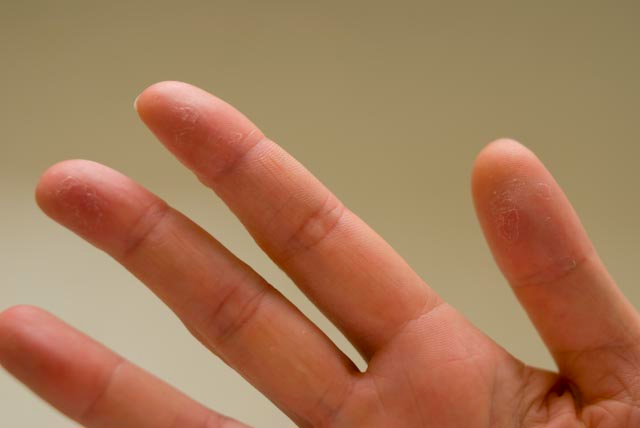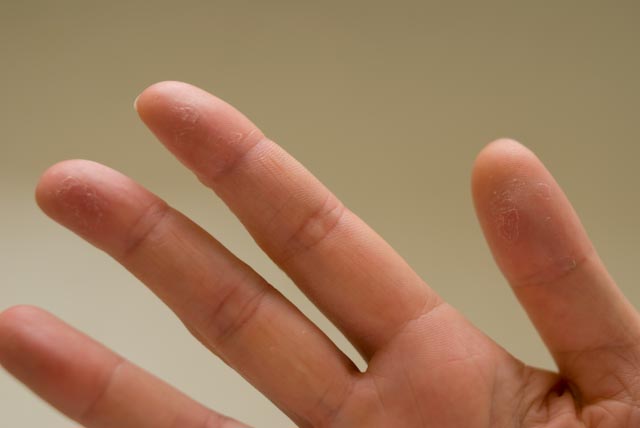
 The winter season tends to be tough on skin, no matter who you are. This year, however, for the first time, my skin reacted worse than usual: I got my first case of eczema on all the knuckles of my right hand.
The winter season tends to be tough on skin, no matter who you are. This year, however, for the first time, my skin reacted worse than usual: I got my first case of eczema on all the knuckles of my right hand.
I’ve never experienced eczema before, so I didn’t understand just how painful it can be. Ouch!
Those of you who’ve experienced this condition know what it’s like. You know about the itchy patches and how they can drive you crazy; how sometimes those patches can deteriorate into rashes, swelling, and redness; and how if you are too rough with your skin, you can end up with cracking, weeping of clear fluid, and scaling-even skin damage and infection.
Since I’ve written a lot about dermatitis, I wanted to know the difference between dermatitis and eczema.
Turns out they’re really similar. “Dermatitis” means “inflammation of the skin,” period. Simple. Eczema describes more the condition of the skin caused by inflammation that is characterized by redness, itching, and oozing.
There are all types of eczema: atopic dermatitis, contact eczema, seborrheic eczema, nummular eczema, hand dermatitis, and more. The most common type is atopic dermatitis-a chronic skin disease that causes itchy, inflamed skin. According to the American Academy of Dermatology, 10-20 percent of children and 1-3 percent of adults have atopic dermatitis. The majority of sufferers get it in childhood before the age of five, but it can appear at puberty or later, like mine. Fortunately for those who get it as children, the disease usually lessens in severity with age.
As far as what causes eczema, we still don’t know. It seems to run in families, and to occur more often in people who suffer from hay fever and/or asthma. Many types of eczema are connected to allergies. Irritant contact dermatitis, for example, occurs after a sensitive person is exposed to harsh detergents, fragrances and dyes, or other irritants. Allergic contact dermatitis can develop when the person is exposed to something to which they’re allergic.
Considering this strong connection to allergies, we can see why researchers believe that having an overactive immune system can be a factor in the condition. In most cases, the inflammation in the skin is caused by the immune cells overreacting to something-be it an irritant or an allergen-and launching an assault that results in inflammation. Compromised skin can also be at greater risk. When skin is dry, flaky, or fragile, the outer layer is not as strong and protective as it should be, so it tends to allow microscopic irritants and allergens to enter the body and cause trouble. That’s one reason why the winter season can bring on cases of eczema, because winter skin is often compromised.
If you suspect you may have some sort of eczema, you can try some natural solutions first. Here are a few suggestions that may help your skin to heal:
- Use lukewarm, not hot, water when you wash, and try to wash less frequently.
- Choose gentle, non-toxic cleansers and moisturize immediately after every cleansing.
- Add oatmeal to your bath and soak-it’s a natural anti-inflammatory and will help calm and soothe your skin.
- Try natural vitamin E on the affected areas-it can help moisturize and heal.
- Look for creams that contain calendula and yarrow-these herbs naturally help relieve itchiness.
- Try moisturizing with natural, virgin oils like coconut-which is highly recommended for many skin conditions-rosemary, and sesame.
- Above all-find out if your eczema is triggered by allergies, then try to reduce your exposure to the allergen.
If allergies are involved, your dermatologist may advise you to get a patch test to help identify those things that you’re allergic to. As far as medical treatment goes, there is no one cure. Instead, most doctors work with you to develop a plan to reduce your flare-ups. That plan usually consists of a combination of medications and lifestyle changes. The good news is that with proper treatment, most cases of eczema can be controlled so they don’t interfere with the rest of your life. The important thing is to continue trying a variety of methods until you find something that works for you.
Do you have eczema? What have you found helps control the condition? Please share your tips.
Photo courtesy the mildlycrafty via Flickr.com.

